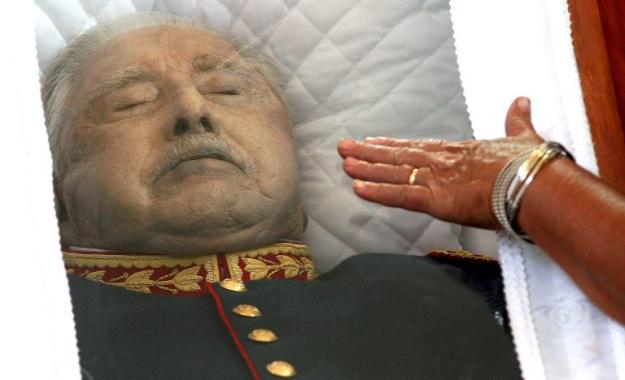Flashback on Pinochet & Left on National Review Online
Excerpts:
When South Africa recently refused to extradite the former Ethiopian ruler Mengistu back to his homeland, there was not a peep of protest, though all of Pinochet’s crimes could have been fitted into an afternoon of Mengistu’s rule, and the tortures practiced in Chile were but therapeutic procedures by comparison with what was done in Ethiopia.
...
It was his achievements, not his faults, that were so hated.
Priceless!
2006-12-14
2006-12-10
RIP Augusto José Ramón Pinochet Ugarte

1915 - 2006
Thanks to the old bolshevik-killer for changing the tide of not only South American but Global history! MSM of course call him "dictator", but the love and respect of his grateful countrymen tell another story - at the cost of some 3,000 lefties thrown out of helicopters over the Pacific, he righted wrong and set the country on unprecedented democratic and economically liberal path. The country, his country!, today is undisputably the richest and best run south of Rio Grande. As a wise rebbe said centuries ago: "By the fruit shall yee judge..." !
2006-12-05
The genuflecting Indian
Well, it´s not only me who thinks about the MaoBadBoyz as murderers, Manvendra Singh even favorably compares Osama bin Loaded to Prachanda - the former killed FAAAR fewer people!
The genuflecting Indian is back at it, grovelling lest the foreigner be displeased. It was a trait observed by a number of 19th century British officials. And it is on display even in the 21st century — supposedly the century India will arrive on the world stage. It certainly can’t if its arrival is preceded by such sycophancy.We first prostrated ourselves when the Nepali Maoist chief Prachanda visited New Delhi. And the same was repeated for Hu Jintao, the President of China.Nepal was six years old as a democracy, with multi-party electoral choices, defections, skullduggery and everything else that happens when the vote determines the voice. In those six years the followers of Chairman Mao could not convince the people of Nepal to give them an electoral majority. So what did they do? They began their own long march to death, despair and destruction. This war on the state began in 1996, and has, hopefully, ended in 2006. The death toll is estimated to be about 13000. Prachanda, the same person now feted as a leadership speaker, led all of this devastation.In his numerous appearances in Delhi, Prachanda’s consistently tried to come across as a saviour statesman. But his task was made easier by the grovelling Indian, who obediently accepted this metamorphosis, sans a squeal. Not a word about the consequences of this destructive decade, in Nepal and in India.Nepal’s Maoists believe, as do their Indian clones, in the use of violence for furthering political goals. It is an integral part of the Maoist Holy Grail. Now put this operation in a different context. Amongst those in the immediate neighbourhood who believe in the use of violence for furthering political aims is Al-Qaeda. So then, would Osama bin Laden make it to the podiums that Prachanda did? Why not? After all, Osama’s terrorists have killed fewer people than Prachanda’s fanatics. The only difference being that while one claims to be on a mission from god, the other swears it is all for the people.It is the People’s Republic, of course, that makes Indians grovel even more. True to their understanding of the host’s psychology, the Chinese toyed with us by reiterating their claim over Arunachal Pradesh in the hours before Hu Jintao was to land in India. Many were naturally agitated. But there were some, expectedly, who were ready to genuflect even in the face of this provocation. Some even went further and declared that the Chinese ambassador’s line was not the policy of the People’s Republic!Through the history of the world, any utterance of the ambassador has been regarded as the policy of his government. The ambassador speaks for his government. If he doesn’t, then he is either recalled by his government, or asked to explain his case by the host country. It is a matter of great shame that in this case neither happened. Beijing didn’t think its ambassador in New Delhi said anything wrong so there was no reason to recall him. And New Delhi didn’t think Beijing’s ambassador said anything wrong enough to be called into the ministry and asked to explain.To top it all, the Indian government went into overdrive to prevent Parliament from putting together a resolution stating that Arunachal Pradesh is an inalienable part of India. The plea taken was that President Hu was still in the country and nothing should be done to spoil his mood.I remembered late Gen BC Joshi’s visit to China. It was the first by an Indian army chief. It was while he was still visiting that the hosts decided to test a nuclear device. His mood was of little concern to the Chinese hosts. But the Indian is willing to forsake national statements so as to pleasure the guest.This trait is the big difference between the world’s last two civilisational states. Over many centuries, China was colonised by India. Intellectually, that is. In the 21st century, Chinese scholars would be the first to acknowledge this, and Indian scholars the first to express their ignorance. Because over time India and China went into decline as foreign rule cemented its grip on both. But while the Chinese have rid themselves of that colonial clasp, Indians are still in its clutches.Economists in India are having a busy time as charts and graphs show upward trends. But all of it will mean nothing until a basic flaw in the mind is rectified. The opposite of grovelling is not growling, for there are other equally effective methods of keeping the spine straight. The day our leaders realise this, India would stand a better chance of making that great leap forward.
Subscribe to:
Comments (Atom)